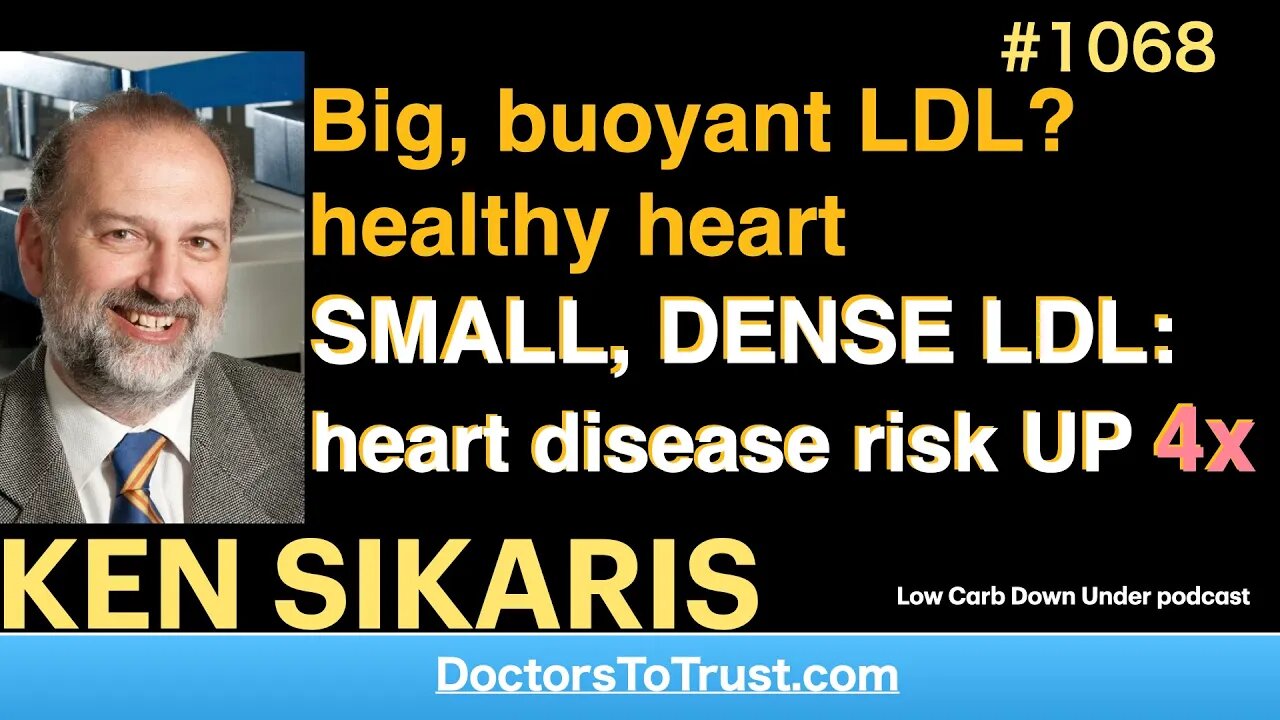Premium Only Content

KEN SIKARIS b | Big, buoyant LDL? healthy heart SMALL, DENSE LDL: heart disease risk UP 4x
http://www.DoctorsToTrust.com
presents episode 1068 | Dr Ken Sikaris
Low Carb Down Under podcast
LDL particle at liver: controlled by
-ApoB [protein]
-LDL receptor
-PCSK9 regulator
Paper, 1972, looked at
abnormalities in receptor...
Normally, LDL disappears in
week or two from blood
If receptor abnormal, it hangs
around in blood 2x
[just like in diabetes]
Too much fructose, end up with too much TG in liver...
-exported as VLDL
-can interact with HDL
[using CETP] which wears
out HDL]
-patient w/ high TG & VLDL
will wear out HDL
"High TG ALWAYS results in
lower HDL"
& high TG interacts w/ LDL
-result: small, dense LDL
due to high TG so: long term LDL in blood
Normal big, buoyant LDL [study]: if stay big, risk of
heart disease: NO CHANGE
if increasing volume of
small, dense LDL:
heart disease risk UP 4x
"Not LDL; but small, dense
LDL causing heart disease"
||||||||||||||||||||||||||||||||
doctorstotrust.com
lowcarbdownunder.com.au
Original Youtube: https://youtu.be/OyzPEii-wo0?si=U26oRJtdxh840ToX
This site will never use corruptible, epidemiological survey research as causal science.
For each short/sharable video, the original Youtube links are provided
None of this content is intended to be individual, personalized medical advice.
We hope you find value for yourself in these short videos &
find them easy to share with loved ones!
DISCLAIMER
The DoctorsToTrust videos are for general informational purposes only
and do not constitute the practice of medicine, nursing or other
professional health care services, including the giving of medical advice,
and no doctor/patient relationship is formed. The use of information on this podcast
or materials linked from this podcast is at the user’s own risk.
The content of this podcast is not intended to be a substitute for
professional medical advice, diagnosis, or treatment. Users should not disregard or
delay in obtaining medical advice for any medical condition they may have and
should seek the assistance of their health care professionals for any such conditions.
-
 4:04
4:04
Doctors To Trust
1 year agoSTEPHEN PHINNEY c | STATINS: no clinical difference in mortality, but RAISE DIABETES RISK
1.84K1 -
 LIVE
LIVE
Glenn Greenwald
4 hours agoWorld Finally Horrified by Israel's Atrocities in Gaza; Mass Starvation Expert Warns of Spiraling Crisis in Gaza; AOC Votes to Fund Israel's Iron Dome | SYSTEM UPDATE #489
3,461 watching -
 LIVE
LIVE
The Quartering
53 minutes agoToday's News Chat & Act 2 Of Expedition 33
561 watching -
 1:46:27
1:46:27
Tim Pool
8 hours agoSin Frontera: The End of Illegal Immigration (DOCUMENTARY PREMIERE - 6pm EST)
162K51 -
 LIVE
LIVE
Barry Cunningham
1 hour agoNEWS ON THE PLOT AGAINST THE PRESIDENT AND IT'S A MOVIE NIGHT!
6,834 watching -
 LIVE
LIVE
SpartakusLIVE
2 hours agoMonday MOTIVATION || Games w/ the BOYS into the NIGHT
143 watching -
 LIVE
LIVE
Jamie Kennedy
1 day agoWhy the Epstein Cover-Up Still Matters | Ep 214 HTBITY W Jamie Kennedy
69 watching -
 LIVE
LIVE
LIVE WITH CHRIS'WORLD
21 hours agoLIVE WITH CHRIS'WORLD - WE ARE READY FOR ACCOUNTABILITY
73 watching -
 LIVE
LIVE
PudgeTV
5 hours ago🔵 Mod Mondays Ep 68 | The Mike Church Show | Welcome to the New Internet
114 watching -
 59:57
59:57
Donald Trump Jr.
3 hours agoObama Behind the Russia Hoax, Full Coverage Live Lee Smith | Triggered Ep260
45.8K87